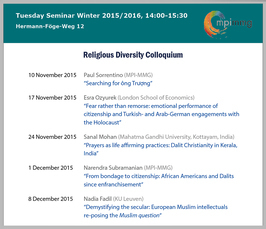"Fear rather than remorse: emotional performance of citizenship and Turkish- and Arab-German engagements with the Holocaust"
Tuesday Seminar Winter 2015/2016
- Datum: 17.11.2015
- Uhrzeit: 14:00 - 15:30
- Vortragende: Esra Ozyurek (London School of Economics)
- Dr. Esra Özyürek is an Associate Professor and Chair for Contemporary Turkish Studies at the European Institute, London School of Economics. She received her BA in Sociology and Political Science at Boğaziçi University, Istanbul and her MA and PhD in Anthropology at the University of Michigan, Ann Arbor. Before joining the LSE she taught at the Anthropology Department of University of California, San Diego. Her most recent book Being German, Becoming Muslim: Race, Religion and Conversion in the New Europe has been published by the Princeton University Press (2014).
- Ort: MPI-MMG, Hermann-Föge-Weg 12, Göttingen
- Raum: Conference Room

For more details please contact vdvoffice(at)mmg.mpg.de.
This talk analyzes the role of Turkish- and Arab-Germans in Holocaust memory culture in Germany, which is commonly celebrated as a model for “mastering the past.” After establishing that the current public anxiety around Muslim background minorities not willing or unable to engage the Holocaust is not true, it shows that the core of this anxiety is that Holocaust triggers in minorities fear rather than remorse. It is this expression of fear that make Turkish- and Arab-Germans appear as not learning the correct lessons from the Holocaust and remain irresponsible and less deserving citizens. Furthermore, expressions of fear disrupt the post-unification German ritual of mourning, based on a Fruedian model of healthy recovery, aims to make the Holocaust a thing of the past and by doing so guarantees that Germany can take leadership role in the European Union uninhibited by its past. Minority activists, however, fight for a Holocaust memory culture that locate the Holocaust not at a distant past, but rather at the center of discussions of contemporary racism in Germany.